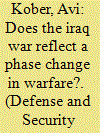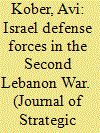| Srl | Item |
| 1 |
ID:
062293


|
|
|
| 2 |
ID:
062052


|
|
|
| 3 |
ID:
136110


|
|
|
|
|
| Summary/Abstract |
Since the late 1970s Israel has been operating postheroically, with postheroic behavior gradually becoming an integral part of its strategic culture and way of war, and often coming at the expense of mission fulfillment. In the Israeli case, the strongest explanation for such behavior has been the marriage of two factors: Israel's engagement in low-intensity conflicts (LICs), which have not threatened its basic security, let alone its existence, and sophisticated technology, which has played a significant facilitating role in applying postheroic warfare. Sparing the lives of the Israel Defense Forces' (IDF's) own troops and of enemy civilians helped gaining greater domestic and legitimacy, as well as greater sustainability in LICs. On the other hand, living up to postheroic warfare's rules had a price not only in terms of fulfilling the military missions, but also in terms of sensitivity to unexpected, sometimes sudden leaps in casualties and/or collateral damage; the danger of lowering the threshold war; and asymmetry with enemies that do not cooperate with postheroic rules and rather fight heroically. The analysis of the Israeli case covers the LIC events Israel has been engaged in from the 1978 Operation Litani, in which postheroic warfare was detected for the same time, to the more recent 2012 Operation Pillar of Defense.
|
|
|
|
|
|
|
|
|
|
|
|
|
|
|
|
| 4 |
ID:
075816


|
|
|
| 5 |
ID:
080864


|
|
|
|
|
| Publication |
2008.
|
| Summary/Abstract |
Whereas in the past, Israeli successes on the battlefield compensated for deterrence and/or early warning failures, in the Second Lebanon War serious problems in Israeli military capabilities and conduct of war were exposed. The article offers explanations for the poor performance of the Israel Defense Forces (IDF): A late perception that it was war; adherence to post-heroic warfare under circumstances that rather required a different approach; the erosion of the IDF's fighting standards due to policing missions which had become its main task since the outbreak of the first Intifada in 1987; false Revolution in Military Affairs-inspired concepts; the adoption of the notion of controlling instead of capturing territory; a centralized logistic system; poor generalship; a hesitant and inexperienced political leadership, and IDF dominance in decisions on military matters
|
|
|
|
|
|
|
|
|
|
|
|
|
|
|
|
| 6 |
ID:
109490


|
|
|
|
|
| Publication |
2011.
|
| Summary/Abstract |
This article addresses the following question: how can one explain the neglect of the intellectual aspects of the profession on the part of the Israel Defense Forces (IDF)? The explanations offered for that neglect are a mixture of cultural and societal factors. The cultural explanation focuses on Israeli strategic culture; the traditional Israeli perception of the combination of rich experience and experience-based intuition as a winning ticket; the tendency to extol improvisation; a cult of material strength; and a strong belief in technology. The social explanation stresses the declining attractiveness of a military career for qualitative young Israelis. The article contends that change can take place only if the IDF undergoes a process of institutional intellectualism - if not willingly then one imposed by the political echelon.
|
|
|
|
|
|
|
|
|
|
|
|
|
|
|
|